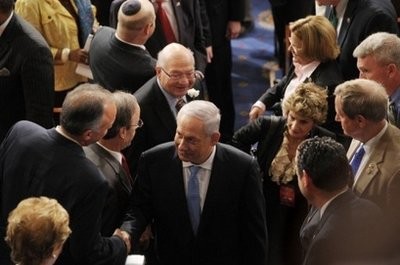Israel's Benjamin Netanyahu told US lawmakers he would uproot settlements in a "generous" peace deal with Palestinians, but ruled out a return to the 1967 borders or sharing Jerusalem.
In his speech to a rare joint session of the US Congress, the Israeli leader broke no substantial new ground in his positions and rejected key calls from US President Barack Obama and the international community, who have been looking for ways to revive the comatose peace process.

Netanyahu also ruled out any return to talks as long as the unity deal between Palestinian president Mahmud Abbas and the Islamist movement Hamas holds, calling the Palestinians' refusal to recognize Israel as a Jewish state the real stumbling block to peace.
"In any peace agreement that ends the conflict, some settlements will end up beyond Israel's borders," Netanyahu said.
"We will be very generous on the size of a future Palestinian state."
But Netanyahu, whose speech was frequently punctuated by warm applause and at least 20 standing ovations from the US lawmakers, again ruled out any return to the borders that existed before the Six-Day War or dividing the holy city of Jerusalem.
The Palestinians demand east Jerusalem as the capital of their future state.
"Jerusalem must never again be divided. Jerusalem must remain the united capital of Israel," Netanyahu said.
The issue of accepting the 1967 borders as a starting point for negotiations has been at the core of an ongoing row between Netanyahu and Obama.
Obama gave public voice last week to the long-held view of the US and international communities that a Palestinian state should be created based on those lines.
Such a state would include the Gaza Strip, the occupied West Bank and mostly Arab but Israel-annexed east Jerusalem, with some adjustments and land swaps so that Israel can maintain settlement blocs.
A senior Israeli official said taking such a strong stand against the proposal had been important.
"We needed to stop the deluge. You have to find that critical issue and make a stand," the official said.
Netanyahu said Israel would not give up its main settlements nor compromise on the issue of Palestinian refugees, calling the 1967 lines "indefensible."
"Israel must have defensible borders because in our part of the world, there is a simple truth: a peace you can't defend is a peace that will not hold," he told Fox News.
As such, his positions are unlikely to entice the Palestinians back to the negotiating table or persuade them to abandon attempts to seek recognition for a Palestinian state when the UN General Assembly meets in September.
In a swift reaction, a Palestinian official said the Israeli leader was just "adding obstacles" on the road to peace.
A far-reaching Israeli initiative has been seen as the only way of heading off a Palestinian attempt to unilaterally secure recognition of statehood.
But analysts said it appeared Netanyahu had not done enough.
"He made peace with Congress (but) there's no formula there for peace with the Palestinians," Israeli analyst Yossi Alpher told AFP.
Obama "pushed all the right buttons on Israeli-American relations and Israel's security needs," but there was "nothing which constitutes a basis for renewed negotiations," Alpher added.
Israeli officials said the speech had not aimed to assuage the Palestinians, but rather to ensure the United States and European powers would not support the UN bid.
"Hopefully, this will lead to a stronger US position and also to other important countries opposing it," said the senior official, noting that Israel believes the Palestinians have an automatic majority at the UN.
Still, Netanyahu said the bid must be "forcefully opposed by all those who want to see this conflict end."
But he also ruled out any negotiations until Abbas severs ties with Hamas.
"Israel is prepared to sit down today and negotiate peace with the Palestinian Authority. I believe we can fashion a brilliant future of peace for our children. But Israel will not negotiate with a Palestinian government backed by the Palestinian version of Al-Qaeda," Netanyahu added in his address.
And he blamed the Palestinians for the failure to reach a peace deal over the last two decades.
"President Abbas must do what I have done. I stood before my people, and I told you it wasn't easy for me, and I said 'I will accept a Palestinian state,'" Netanyahu said.
"It is time for President Abbas to stand before his people and say: 'I will accept a Jewish state...' Those six words will change history."
























